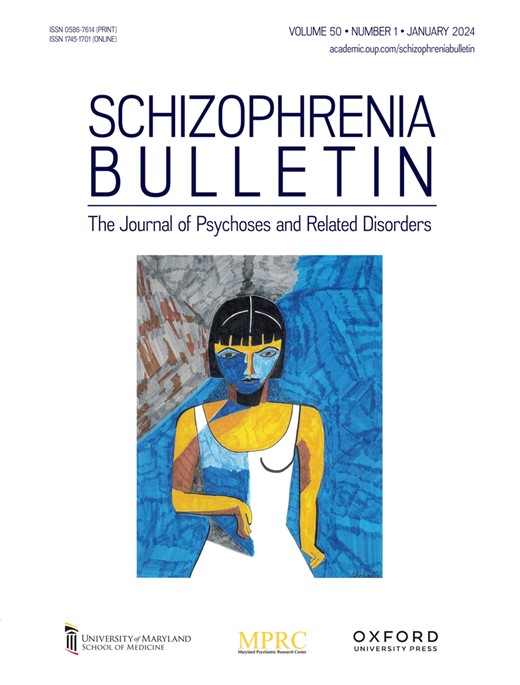首发精神病和精神分裂症的社会心理管理:美国退伍军人事务部和美国国防部临床实践指南摘要
IF 5.3
1区 医学
Q1 PSYCHIATRY
引用次数: 0
摘要
背景:尽管在国防部(DOD)和退伍军人事务部(VA)中有大量的人接受过首发精神病和精神分裂症的治疗,但国防部和VA都没有对这些疾病的治疗提出正式的建议。这一差距导致国会要求制定精神分裂症治疗的临床实践指南(CPG)。本文报道了VA/DOD临床实践指南中关于首发精神病和精神分裂症管理的社会心理和康复建议。研究设计CPG是由来自国防部和退伍军人事务部的心理健康和初级保健提供者的跨学科小组根据退伍军人事务部/国防部循证实践指南工作组指定的方法开发的。该小组制定了关键问题并确定了关键结果,指导对2011年11月至2021年12月发表的文献进行全面检索。所考虑的证据仅限于系统评价、荟萃分析和随机临床试验。建议是基于使用建议评估、发展和评价分级(GRADE)方法对证据的评价。研究结果回顾过程产生了4项针对首发精神病的社会心理/康复治疗建议(早期干预服务、家庭干预、个体安置和支持(IPS)以及精神病的认知行为治疗)和11项针对精神分裂症的建议(家庭和护理服务、自信的社区治疗、IPS、戒烟、技能训练、认知训练、心理治疗、有氧运动、瑜伽、体重管理、以及基于电话的护理管理)。VA/DOD CPG反映了首发精神病和精神分裂症治疗的扩展,并强调了制定临床实践指南的挑战。本文章由计算机程序翻译,如有差异,请以英文原文为准。
Psychosocial Management of First-Episode Psychosis and Schizophrenia: Synopsis of the US Department of Veterans Affairs and US Department of Defense Clinical Practice Guidelines
Background Despite the large number of people treated for first-episode psychosis and schizophrenia within the Departments of Defense (DOD) and Veterans Affairs (VA), neither the DOD nor VA had established formal recommendations for the treatment of these conditions. This gap led Congress to require the development of clinical practice guidelines (CPG) for the treatment of schizophrenia. This paper reports on the psychosocial and rehabilitative recommendations presented in the VA/DOD Clinical Practice Guidelines for Management of First-Episode Psychosis and Schizophrenia. Study Design The CPG was developed by an interdisciplinary panel of mental health and primary care providers from DOD and VA following methods specified by the VA/DOD Evidence-Based Practice Guideline Work Group. The panel formulated key questions and identified critical outcomes that guided a comprehensive search of the literature published from November 2011 to December 2021. The evidence considered was limited to systematic reviews, meta-analyses, and randomized clinical trials. Recommendations were based on the evaluation of the evidence using Grading of Recommendations Assessment, Development and Evaluation (GRADE) methods. Study Results The review process produced 4 psychosocial/rehabilitative treatment recommendations for first-episode psychosis (early intervention services, family interventions, individual placement and support (IPS), and cognitive behavioral therapy for psychosis) and 11 recommendations for schizophrenia (family and caregiver services, assertive community treatment, IPS, smoking cessation, skills training, cognitive training, psychotherapies, aerobic exercise, yoga, weight management, and telephone-based care management). Conclusions The VA/DOD CPG reflects the expansion of treatments for first-episode psychosis and schizophrenia and highlights the challenges in developing clinical practice guidelines.
求助全文
通过发布文献求助,成功后即可免费获取论文全文。
去求助
来源期刊

Schizophrenia Bulletin
医学-精神病学
CiteScore
11.40
自引率
6.10%
发文量
163
审稿时长
4-8 weeks
期刊介绍:
Schizophrenia Bulletin seeks to review recent developments and empirically based hypotheses regarding the etiology and treatment of schizophrenia. We view the field as broad and deep, and will publish new knowledge ranging from the molecular basis to social and cultural factors. We will give new emphasis to translational reports which simultaneously highlight basic neurobiological mechanisms and clinical manifestations. Some of the Bulletin content is invited as special features or manuscripts organized as a theme by special guest editors. Most pages of the Bulletin are devoted to unsolicited manuscripts of high quality that report original data or where we can provide a special venue for a major study or workshop report. Supplement issues are sometimes provided for manuscripts reporting from a recent conference.
 求助内容:
求助内容: 应助结果提醒方式:
应助结果提醒方式:


